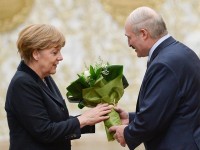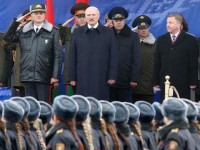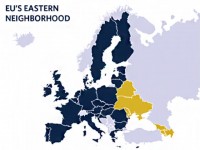Minsk’s muddled media clampdown could jeopardize warming of relations with the West.
Andrei Yahorau: Belarus should decide on its path of development

For the Belarusan foreign politics it would be better to reject the use of the geopolitical seesaw and to decide on the direction in which the country is moving. This opinion shared Andrei Yahorau, the political scientist and the director of the Centre for European Transformation.
Long trip to Indonesia, Singapore and the United Arab Emirates Alexander Lukashenko performed recently gives the reason to think about the image of today’s Belarusan foreign politics. This was the subject of discussion with Andrei Yahorau suggested by the EuroBelarus Information Service.
— Due to the fact that Belarus lacks clear foreign-policy stance, in most cases our country acts by occasion, depending on the actual point in the development of relations with the major geopolitical partners — the European Union and Russia.
Today the situation is quite unfavorable both in the eastern and in the western directions, which makes Belarusan authorities look for the good news elsewhere.
In this particular case activity aimed at entering new market, yet unknown to Belarus, are rather rational, as it all is about searching trade area for Belarusan production as well as searching investment that are of vital importance for the Belarusan economy now.
There are certain prospects for Belarus in these relations, though it doesn’t resolve the main problem, which is poor relationship with the EU and Russia. Only through developing normal relations with these political players that the extension of Belarus’ prospective in the third countries can be considered. For now it resembles rushing around in the search for solutions of actual problems. Accordingly, these actions won’t be of much use.
— What do the Belarusan authorities miss in their efforts to mend relations with the main partners?
— I would say that it is sound sense that they miss, or, to be precise, strategic long-term self-determination of Belarus in the world. Such a small nation as Belarus cannot be absolutely independent from the structure of other political relations. Today Belarus has to decide on its path of development: either back in USSR, or forward, into the modern democratic society, regulated according to the European norms and standards. And Belarus has to decide this dilemma once and forever. And while this program is not built, we will remain in this state of situational swinging, which is of no use neither for the country nor for its people.
— But today’s Belarusan authorities find the use of geopolitical seesaw rather beneficial, don’t they? And how much is it possible that they will refuse this tactics?
— The benefit of this situation is indeed relative. Because in this situation the stability of the regime decreases. In the situation when two centers are in opposition this maneuvering is a serious challenge that requires new creative means each time. To lose these means one day would be a catastrophe for Belarus, leading to the loss of independence and expropriation of the national property.
All in all, we could expect that if the regime launches a large-scale program of reforms and introduces European standards in politics, economy, social and cultural spheres of life and so on, we could assume that it would reorganize Belarus and start working for the good of the country. It would basically allow the regime to remain for a rather long period, as well as predetermine the switch from the authoritarian authority to the democratic one in the future.
But here we face another kind of challenge for the system: the authorities have to provide freedom at least in the economic relations. Modernization is connected with some other types of challenges the regime doesn’t dare to accept. The regime is afraid of sudden loss of power over the country; however, I believe it shouldn’t.
Others
-
In Belarus, a rising fear: Will we be the next Ukraine?
The relationship between Russia and Belarus has never been an easy one. The two former Soviet republics have spent the last two decades on a roller coaster ride — sometimes allies, sometimes adversaries in heated public rows.
-
The EU’s Benign Neglect of Eastern Europe
Between November 6 and December 11, 2015, Carnegie Europe continued its Capitals Series. In this second phase, the focus was on the EU’s Eastern neighbors, which the bloc has so often zigzagged over in trying to establish a coherent policy toward them collectively or bilaterally.
-
New ENP and Civil Society’s Role in Focus of the 7th EaP CSF Annual Assembly (Photo)
The 7th Annual Assembly of the Eastern Partnership Civil Society Forum was held in Kyiv on 19-21 November attracting around 300 participants, observers and guests who attended more than 20 sessions and a Networking Fair in the framework of the Assembly.
-
Is social economy a phenomenon for Belarus?
The conference “Social economy: how to be successful despite the crisis” launched in Minsk on October 22.








Comments
From farewell to a new Eastern policy and towards a new development
Poland and Germany were both initiators and drivers of a New Eastern policy linked to the Eastern neighborhood and Russia/Soviet Union.